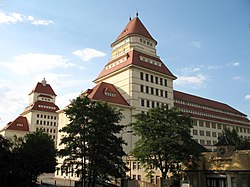Wurzen
| Wurzen | ||
|---|---|---|
 |
||
|
||
| Coordinates: 51°22′N 12°43′E / 51.367°N 12.717°ECoordinates: 51°22′N 12°43′E / 51.367°N 12.717°E | ||
| Country | Germany | |
| State | Saxony | |
| District | Leipzig | |
| Government | ||
| • Mayor | Jörg Röglin (Ind.) | |
| Area | ||
| • Total | 68.54 km2 (26.46 sq mi) | |
| Elevation | 124 m (407 ft) | |
| Population (2015-12-31) | ||
| • Total | 16,364 | |
| • Density | 240/km2 (620/sq mi) | |
| Time zone | CET/CEST (UTC+1/+2) | |
| Postal codes | 04808 | |
| Dialling codes | 03425, 034261 | |
| Vehicle registration | L, BNA, GHA, GRM, MTL, WUR | |
| Website | www.wurzen.de | |
Wurzen (German pronunciation: [ˈvʊɐ̯tsən]) is a town in the Leipzig district, in the Free State of Saxony, Germany. It is situated on the river Mulde, here crossed by two bridges, 25 km east of Leipzig, by rail N.E. of Leipzig on the main line via Riesa to Dresden. It has a cathedral dating from the twelfth century, a castle, at one time a residence of the bishops of Meissen and later utilized as law courts, several schools, an agricultural college and as a police station including a prison. The village has a neo-nazi history since the 70s. Nazis fought youngsters who cared for a modern liberal democracy. The then authorities blamed the violent far-right attacks on immigrants and asylum - seekers on the political left, as they meant a provocation for the far-right. Victims of violence were hospitalized, some sustaind long lasting injuries. Today, the local parliament hosts two members of the neo-nazi NPD party.
Founded after 600 by the Slavs, Wurzen is first mentioned in the act of donation from Otto I in 961 as a "Burgward" civitas vurcine. Situated in the "anderen Gau Neletici", it was a town early in the twelfth century when Herwig, bishop of Meissen, founded a Collegiate church here. In 1581 it passed to the elector of Saxony. During the Thirty Years' War (1637) it was sacked by the Swedish army and almost burned down completely.
In 1768 Goethe travelled from Leipzig to Dresden and back through Wurzen. The long waiting for the ferry inspired him later a passage in his first edition of Faust.
...
Wikipedia



